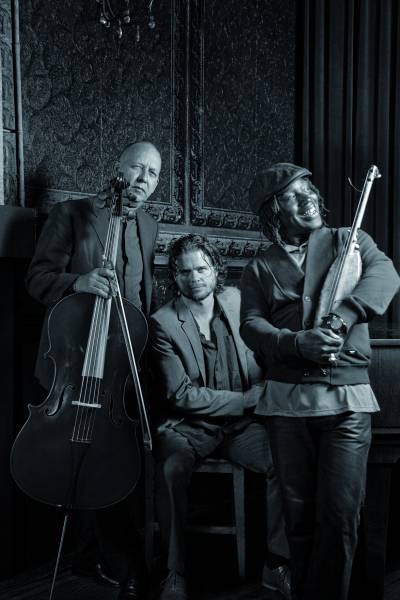Various Artists: It Takes Two to Tango (W&W/Birdland)
Paul Motian: Standards Plus One (W&W/Birdland)
Various Artists: Introducing M-Base (W&W/Birdland)
Reijseger/Fraanje/Sylla: Count Till Zen (W&W/Birdland)

Record companies are routinely depicted as the music business’s evil exploiters, the tales of rip-offs, mismanagement, bullying and cocaine being legion. Thankfully there are also many people from multinational and independent labels who are driven to promote the music they love, and oddly, given the breadth of the musical world, two who particularly stand out are both Munich-based. One is ECM Records’ Manfred Eicher and the other Stefan Winter, who this year celebrates 30 years as a producer, firstly for his JMT (Jazz Music Today) imprint and then, since 1997, for Winter & Winter.
Winter likens producing to directing films, and has stood up for music as art in a world keen to dumb it down and commodify it. His willingness to record anything from Brahms to free jazz and tango to African music reflects a commendable perspective in which idiom is completely subservient to the quality of the music itself, which in his scheme of things should be charged with a multi-layered mesh of emotions. He has been pivotal in championing and documenting scores of brilliant musicians from around the world involved in jazz, classical, experimental and traditional music, as well as film scores; musicians whose work may otherwise have been undervalued or ignored entirely.

To commemorate the 30th anniversary W&W has released a series of Jubilee Edition compilations alongside the usual output of new material. Three of these offer some insight into the breadth, thinking and care of Winter and his exceptional label. One is Introducing M-Base, subtitled Brooklyn in the 1980s. M-Base was a ground-breaking collective formed by saxophonist Steve Coleman, whose music provided a vibrant counterpoint to the sterile neo-bop conservatism that was taking hold in New York at the time. Winter gave Coleman and his colleagues a platform that launched some careers and consolidated others. In the former camp was a young and adventurous Cassandra Wilson, whose singular instincts as a singer were already evident. Such other vital players as pianist Geri Allen and saxophonists Greg Osby and Gary Thomas were also involved, and a fierce energy was often at play, as though Coleman and his cohorts were proclaiming that they were not going to let creative music be commandeered by the rear-view-mirror brigade. The presence of such older-generation firebrands and Andrew Cyrille, Olu Dara and Julius Hemphill was a guide to M-Base’s credentials and intent.
When Winter turned from JMT to W&W in 1997 his first dozen releases gave a strong pointer to the future, with a recording of Bach’s first three cello suites (performed by Paolo Beschi) soon followed by a series of ravishing tango albums and works by three people who would become stalwarts of the label: drummer Paul Motian, pianist Uri Caine and cellist Ernst Reijseger.

Some of the tango series emerged under W&W’s AudioFilm series, which carries the delightful epithet of “cinema for closed eyes”. These are not soundtracks, but music deemed sufficiently evocative to be transporting. The contents of the Jubilee Edition compilation It Takes Two To Tango are stunning. Although tango is widely played the world over, it remains hard to beat the Argentineans for the combination of slicing rhythmic accuracy and a rampant passion that borders on eroticism. The exceptional artists include singer Lidia Borda, pianist Andres Linetzky, guitarist Anibal Arias and bandoneonist Osvaldo Montes, playing works by some of the finest traditional tango composers.
Among W&W’s many jazz musicians one stands at the pinnacle. Paul Motian was probably the most important band-leader in the idiom for the two decades before his death in 2011. He was certainly the most important drummer, transcending technique to enter a world in which he created shadows and enigmas. The Jubilee Edition Standards Plus One compilation centres on his trio with guitarist Bill Frisell and tenor saxophonist Joe Lovano, variously joined by bassist Charlie Haden and alto saxophonist Lee Konitz. Haden may have been my favourite bassist of all time, yet I prefer this trio without him, leaving Frisell free to splatter the sonic sky with a Milky Way of notes that are equally glittering and mysterious, while Motian cross-hatches the firmament’s dark sides, and Lovano reassures with more earthbound melody.

In all Winter recorded Motian 22 times across 19 years, and given that the drummer still released intermittently on ECM during this period a prodigious body of work was created at a time when the drummer/composer, in his 60s and 70s, was reaching as deeply into universal truths as anyone in music.
One of the label’s new releases is the follow-up to the astounding Down Deep debut from Ernst Reijseger (cello), Harmen Fraanje (piano) and Mola Sylla (voice, kongoma, xalam, percussion). That was the most thorough integration of jazz, classical and African elements I have heard, and while the new one, Count Till Zen, may lack the shock-of-the-new factor, the music is no less startlingly original, although perhaps less studded with unforeseen emotional spikes. Here the trio favours song-forms, out of which Mola’s voice sometimes arches up like a distress flare from a ship. Reijseger is surely the most versatile improvising cellist around, and the lyrical Fraanje is that miraculous rarity, a pianist who doesn’t fill in all the holes. In fact the trio’s sense of space defines it as much as the loping, genial grooves and startling juxtapositions.